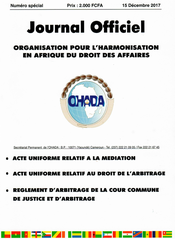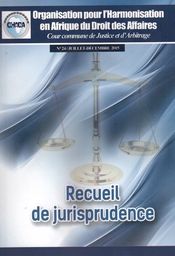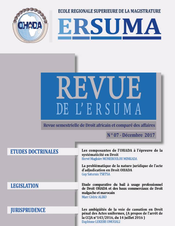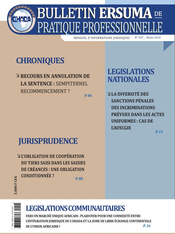Bibliothèque Numérique de l'OHADA
| Titre : | La favor contractus dans les principes UNIDROIT et l'avant-projet d'Acte Uniforme sur le Droit des Contrats en OHADA |
| Auteurs : | NGWANZA, Achille André |
| Type de document : | Thèse |
| Editeur : | Paris : Université Paris-Sud 11, 2011 |
| Format : | 519 p. |
| Langues: | Français |
| Index. décimale : | 346 (Droit civil - Droit privé) |
| Catégories : |
CENTRALE DES THESES EN DROIT AFRICAIN ET COMPARE DES AFFAIRES |
| Tags : | FAVOR CONTRACTUS ; PRINCIPES UNIDROIT ; PROJET D'ACTE UNIFORME ; DROIT DES CONTRATS ; DROIT OHADA. |
| Résumé : |
Les Principes d’Unidroit relatifs aux contrats du commerce international ont été élaborés dans la perspective de créer des règles universelles tournées vers le pragmatisme et non la défense d’une tradition juridique. Dans l’espace OHADA, un avant projet d’acte uniforme sur le droit des contrats a été rédigé sur le modèle des Principes Unidroit, ce en reprenant quasiment toutes leurs dispositions. Au regard de la neutralité culturelle des Principes Unidroit, il est fondé de se demander s’il était opportun de s’en inspirer pour rédiger un texte dans un espace majoritairement civiliste. Le traitement pertinent de cette question postule de s’arrêter sur le substrat philosophique innervant les Principes Unidroit. Dans cette optique, la favor contractus, contrairement à la liberté contractuelle, la bonne foi, l’application des usages et la lutte contre la déloyauté dont l’orientation axiologique est claire, est un bon prisme d’analyse. A travers la protection du contrat, il est aisé de savoir si les Principes Unidroit constituent une agression à la tradition juridique majoritaire des pays de l’espace OHADA. Pour maitriser la variété des risques pesant sur l’acte juridique, les Principes Unidroit abordent la sauvegarde du contrat sous le prisme temporel. Ainsi, ils veillent à garantir son existence et à assurer son exécution. Ce faisant, ils n’arbitrent pas entre efficacité économique et civisme contractuel. Il en résulte que, malgré l’imperfection de certaines de leurs règles, les Principes constituent une bonne source d’inspiration pour le législateur OHADA qui gagnerait à les améliorer avec les avancées des projets de réforme du droit des contrats en France. The UNIDROIT Principles of International Commercial Contracts were drafted with the aim of creating universal rules based on a pragmatic approach, and not in defense of a particular legal tradition. In the OHADA area, a preliminary draft Uniform Act on contract law was drafted using the Unidroit Principles as a model, which took up nearly all of the provisions. Given the cultural neutrality of the UNIDROIT Principles, one may wonder whether this instrument was indeed an appropriate source of inspiration for a predominantly civil law area. A proper analysis of this issue implies to scrutinize the philosophy underlying the Unidroit Principles. In this regard, and contrary to concepts such as freedom of contract, good faith and fair dealings, due consideration given to usages and fight against unfairness which have a clear axiological orientation, favor contractus provides a good lens for analysis. Focusing on the protection of the contract, it will be easily understandable whether the UNIDROIT Principles are an assault to the legal tradition of the majority of OHADA countries. With a view to controlling the variety of risks bearing upon the contract, the Unidroit Principles deal with the protection of the contract under a temporal perspective, keeping it in existence and ensuring its performance. In so doing, they do not make a choice between economic efficiency and contractual fairness, but integrate both. As a result, and despite the imperfection of some of their rules, the UNIDROIT Principles provide a valuable source of inspiration for the OHADA legislator, who could also benefit from certain improvements to be drawn from the contract law reform projects in France. |
Exemplaires (1)
| Code-barres | Cote | Support | Localisation | Section | Disponibilité |
|---|---|---|---|---|---|
| 471 | 346 NGW | Papier | Centre de Recherche et de Documentation de l'ERSUMA (Porto-Novo, Bénin) | Rayonnage : Thèses non publiées | Disponible |


















